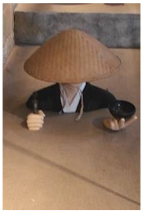I never knew my mother‘s father, Lester Feldman, as he passed away at a young ageduring the WWII years (But not as a result of combat) before I was born. Upon return of my father from military service in Europe, my parents got right down to the job at hand, and I was born in 1947. Thus, I never knew him or felt his arms in a hug. I’ve seen a few photos. I also was named after him in the Jewish custom. (I am told my name would’ve been Lawrence have been a boy.)
reflecting on the passing at 102 years of age this week of the retired Grand Master of the Urasenke tradition of Chanoyu. I have been reflecting on his legacy and the impact he has had on me through my late teacher who passed away at 103 years old on her birthday. I didn’t know him personally either, but like MOM‘s dad, who I never had to create an affectionate name for such as granddad or grandpa, he too gave me a name: SoChi. The character So connects me to the great family of chanoyu practitioners descendent from Sen no Riku. The Chi, (pronounced like “cheese”) Is a reference to the way Japanese people pronounce my last name, which is “do-ee-chee), a term Further complicated by the fact that it means German In the German language. The character chosen was an auspicious sounding word meaning “intelligent”. Hence the idea of one living up to one’s name.
One day during class, my dear late sensei, Sosei Masumoto, Would occasionally ponder, I wonder what name Oiemoto (The title of grand master) is going to give you. I was not familiar with the naming process but early on I wondered why The first names of all of the Tea practitioners of seniority experience Begin with the phrase “so” (Since I can’t read kanji, I never noticed it in the directory of our group.) I eventually knew that this designation was to link us all to the lineage. It would be an honor to have such a formal recognition and encouragement of my study.
As I was in the midst of learning a particular procedure for wiping a utensil, I looked at my teacher and said, “I have a suggestion for a name that would be very meaningful for m, But I would have to stop what I’m doing for a second and put down the utensils as I need to use my hands to explain. Sensei looked at me and I put down the utensils and said: How about “SoNu”!? I then went onto explain that it is in the Yiddish-go, Yiddish language of my matrilineal heritage. I gestured with my hands as if to urge a storyteller to get to the point already!
Sensei looked very befuddled, but it was probably the way she normally appears when I am seated in the student position trying to remember a procedure.
So, nu, SoChi!
Here I am now practicing again the basics under Sen Soshitsu XVI, the third Urasenke Grand Master under whom Sosei Matsumoto studied and transmitted chanoyu to whomever would find peace making a bowl of tea.
Kansha!

No comments:
Post a Comment